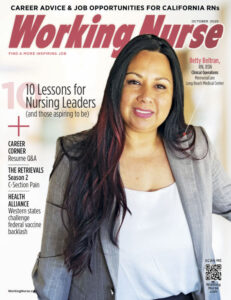Career Corner
Interviewing Tips for Nurse Managers
How to hire (and keep) the best nurses for your team

If you’re a nurse manager, hiring qualified nurses and reducing turnover are some of your most important responsibilities.
When you’re short-staffed, it’s easy to want to fill vacancies as quickly as possible, but one of the best ways to reduce turnover is to make sure the nurses you hire are the right fit. Here’s how you can do that during the interview process.
Your Star Employees
Before you schedule any interviews, take some time to think about what characteristics are most important to you and your department. This will help you ask your candidates the right questions.
Think about your star employees: What makes them outstanding? Also, consider whether there are any qualities that DON’T work well for your team. A candidate might be a great nurse and still not be the right nurse for the job.
The Golden Rule
When dealing with applicants, always follow the Golden Rule: “Treat others the way you want to be treated.” This means being cordial and professional, and ensuring that all candidates can go through their interviews with dignity. As a nurse recruiter, candidates have come back to me afterwards to let me know how they were treated by the nurse manager.
You want each candidate to leave with a good feeling about your organization and your unit. Remember, an applicant who’s not a fit for your current vacancy could be perfect for another position in the future.
Respond Promptly
The interview process really starts when you first receive a candidate’s application.
Timeliness of response is important. Nurses are very happy to hear back quickly about their interest in your position. With a shortage of experienced RNs, a timely response to an application also helps you stand out among all the organizations the candidate is interested in.
There have been times when I saw an application come in from a qualified RN for a hard-to-fill position and called the candidate immediately. We would both laugh when they said they literally just clicked “send” a few minutes ago. It was a great way to make an excellent impression on a nurse looking for a job.
Scheduling
- Have your schedule and availability ready, with flexible dates and times. This will reduce back-and-forth, especially if you have your recruiter or an assistant setting up the interviews.
- Schedule interviews during a time when you’re not running to another meeting. (I know how hard this can be!)
- Leave yourself enough time to review the application and resume, and highlight any questions you have about the candidate’s prior experience and training.
- Ask the best way to reach the candidate (e.g., phone, email, text) if you need to leave a message.
- Try your best to keep the scheduled appointment and be on time. We all understand when you need to cancel because JACHO, CMS, or DHS makes a surprise visit or there’s an emergency with a patient or a family, but reschedule promptly if you do.
Preparation
- Hospitals can be noisy places. Try to find somewhere you can have relative peace, and be aware of any outside noises that might distract you or the candidate. One of my offices was right outside the overhead paging system, so I often had to pause interviews until a page was over.
- If you’re conducting a virtual interview, make sure you check what the candidate will see in the background. Any confidential information should be safely out of view.
- Write down any questions you want to ask so you won’t forget.
During the interview
- If you expect to be interrupted, let the candidate know ahead of time.
- Always listen more than you talk — you want to really get to know the nurse you’re interviewing.
- Ask follow-up questions, even if it’s just to say, “Tell me more about that.”
- Avoid asking questions in a demeaning or belittling way (not that you would ever do that!).
- Ask the candidate to share actual work scenarios they’ve experienced as a nurse. What did they do in that situation? What was the outcome? Was there anything they wish they’d done differently? Previous behavior is a good indicator of future responses.
- Limit your questions to job requirements, qualifications, education, experience, and ability to perform essential job functions.
- Refrain from asking any questions that could be perceived as discriminatory, especially regarding age, gender, race, religion, marital status, sexual orientation, national origin, disability, or pregnancy. For instance, you should never ask a candidate “Are you married?” or “Do you have any kids?” The manager of one of our units, frustrated after having had several employees go out on maternity leave, once asked a candidate, “You’re not planning on getting pregnant, are you?” The candidate later let us know about this very inappropriate question. Questions regarding salary history should also be avoided.
Follow-Up
- As soon as possible afterwards, let the candidate know if you will be moving forward with them or not. In most organizations, your recruiter will assist with this notification.
- A quick email thanking the candidate for meeting with you is always a nice gesture.By following these tips, you can make your next hire your best hire. Happy recruiting!
LEVELL ROMEYN has 28 years’ experience as a nurse recruiter at various Southern California hospitals.
In this Article: Job Search Advice






